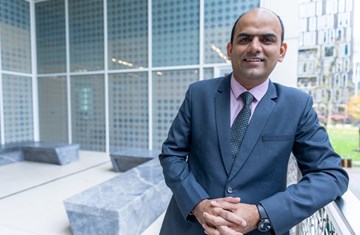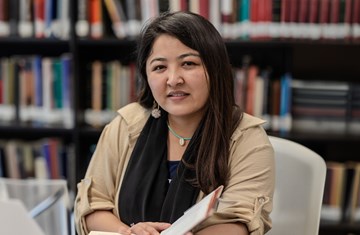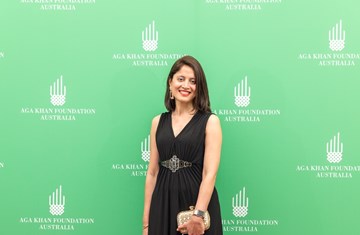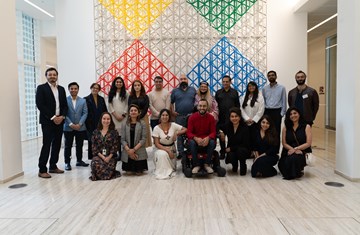World Teachers' Day - Applauding the service of teachers

To mark World Teachers Day on 05 October, we asked some of the global network of IIS-trained Secondary Religious Education Teachers as well as some of our colleagues who teach, some questions about teaching and teachers.
What comes to mind when you think of the word ‘teacher’?
“When I hear the word 'teacher,’ I often think of someone who helps and guides others, imparts knowledge, and greatly influences students' lives. They help students understand the world better and learn useful things. To me, teaching isn't just a job that makes me feel good, but it's also a way to make a difference in the lives of my students. I get to help them learn good values and get ready for the challenges they will face in the future. I have always considered my teachers as role models to whom I looked up to for guidance and inspiration. As a teacher myself, I aim to be a good role model for my students through my teachings and actions.”
–Faridoon Haidary, STEP teacher, Afghanistan-Canada
“A teacher is fundamentally a lifelong learner, driven by curiosity to understand the world. They are the guiding presence in a classroom, demonstrating empathy towards students and fostering a nurturing environment. These qualities hold great importance because, beyond being labeled as a "teacher," they embody what it means to be a role model and a source of inspiration, playing a pivotal role in broadening a child's horizons. Being a teacher demands both passion and unwavering dedication. While each of us continues to be a learner throughout our lives, a teacher not only learns for their own growth but also for the growth of their students.”
–Zohra Gabrani, STEP teacher, India-Portugal
“Teaching and learning are, for me, symbiotic, in that teaching engenders self-learning and reflection. As I teach, I get the opportunity to share my knowledge, while also benefiting from the varied vantage points of my students. Student perspectives and questions expand my horizons and trigger further enquiry. This cyclical acquisition and transmission of knowledge contributes to a learning community, belonging to which is truly a privilege for me.”
– Dr. Shainool Jiwa, GPISH Professor and Head of Constituency Studies, IIS

A painting by Zohra Gabrani, STEP teacher, created while contemplating what teaching means to her.
What does teaching mean to you?
“Teaching to me means caring for others. In other fields, the goal is to collect money, goods, products and ideas, while in education, it is to impart your knowledge to as many people as possible. The classroom is a space where it is most successful when everyone learns or grows together.”
– Nadir Wazir, STEP Teacher, USA
“Teaching, for me, is a unique opportunity to engage with inquisitive minds that approach you with a flood of questions and inquiries. These students' questions not only challenge your preconceived notions but also serve as a wellspring of new research and ideas. Therefore, teaching is an exercise in institutional subversion and rebellion, as far as my views are concerned. Student queries disrupt and subvert the existing edifice of knowledge, allowing for the emergence of new perspectives within established subjects.
"It is a personal challenge that I willingly embrace to ensure that my thinking doesn't get fossilised. I am sure that this endeavour is equally rewarding for students as it affords them the opportunity to dismantle the old idols of knowledge and construct new ones in their place."
-Zulfiqar Khimani, GPISH lecturer and Educational Programmes Manager, IIS
What role do students play in the life of teachers?
“Teaching has always been intertwined with my learning journey. I recall fondly how, from my early years, I enjoyed explaining complex concepts to friends and younger siblings. This passion for teaching and learning has remained steadfast throughout my evolving career. Drawing from my experience as a process trainer, and as a Religious Education teacher, I've learned that each student has unique needs. To accommodate this diversity, I embrace various approaches and tailor resources to the student's requirements."
"My objective as a STEP teacher is to equip students for the rapid-paced global environment of today. I aim to guide them through adolescence by empowering them with the skills to grapple with the unknown and devise solutions within an ethical framework. Besides, I love to experiment with new innovative ways of engaging students in the learning process, and self-reflection has been a very powerful teacher in this endeavour. After all, I believe that when it comes to education, the process is often the product, and I continually learn as I teach!"
– Altaf Somani, STEP Teacher, India
"For me, one of the most rewarding aspects of teaching is working with students in developing the skills and knowledge required to effectively navigate both the opportunities and the challenges that the world presents to humanity, their own communities, and the communities in which they live. We develop, create, and learn from one another, in order to promote harmony and the larger good in the world, among other things."
-Zamira Dildorbekova, STEP lecturer and STEP Programme Leader, IIS
On the occasion of World Teachers Day, The Institute of Ismaili Studies extends a deep gratitude to all the teachers across the globe for serving the global Ismaili community in their best capacities.





